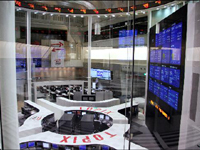Japan companies fend off slowdown in U.S. economy
Japan's Topix index went up for a fourth trading day, led by automakers after Nissan Motor Co. forecast higher sales, boosting confidence companies will get over a slowdown in the U.S. economy.

Nissan Motor Company Limited, shortened to Nissan, is a multinational automaker headquartered in Japan.
It is one of the largest car manufacturers. Nissan is among the top three Asian rivals of the "big three" in the U.S. Currently they are the third largest Japanese car manufacturer. It operates the Infiniti brand.
Nissan rose to the highest in almost two weeks after forecasting increasing demand in emerging markets. Paper makers jumped after the Nikkei newspaper said they plan to increase prices. Nippon Steel Corp. rose on a report it will hire more employees to expand production.
Thus a strategist concluded that Japanese automakers have become “much less dependent on North America ”.
The Topix Index added 4.11, or 0.3 percent, to close at 1,224.15, while the Nikkei 225 Stock Average was little changed at 12,480.09 in Tokyo. Almost the same number of stocks rose and fell on the Topix.
Nissan, which has the highest dividend yield among companies included in the Nikkei, jumped 3.6 percent to 890 yen, the highest since March 12. Bigger rival Honda Motor Co. gained 2.6 percent to 2,950 yen, while Mazda Motor Corp. rose 1.9 percent to 372 yen.
Sales for the year starting in April will surpass the current year's target of 3.7 million vehicles, Nissan said on March 21 after the market shut. Chief Executive Officer Carlos Ghosn said last month he expects sales in emerging markets, including Russia, India and China, to increase 20 percent.
Investors who buy the stock by tomorrow will be eligible for dividend payments. Nissan forecasts an annual dividend payment of 40 yen (40 cents).
Hokuetsu Paper Mills Ltd. soared 7.1 percent, the steepest jump since July 2006, to 450 yen. Oji Paper Co., the nation's largest paper maker, added 3.4 percent to 461 yen, while smaller rival Daio Paper Corp. rose 1 percent to 694 yen.
Daio plans to raise prices by at least 15 percent from May to offset an increase in oil costs, the Nikkei newspaper said on March 22. Rivals including Oji and Nippon Paper Group Inc. will do the same, the newspaper said. Daio said today just before the market shut it would brief the media on an increase in prices.
Nippon Steel, the world's second-biggest steelmaker, added 4.2 percent to 493 yen, the highest close since March 6. Kyodo News said on March 23 the company will increase hiring next year to boost production capacity and expand business overseas.
Resona Holdings Inc., the nation's fourth-largest publicly traded bank, jumped 6.6 percent to 179,000 yen, leading a gain by financial companies. The Tokyo-based bank has decided to sell its headquarters for about 150 billion yen, the Nikkei reported today, without citing anyone.
Mitsui Sumitomo Insurance Co. slumped 5.4 percent to 1,063 yen, the biggest decline among companies on the MSCI World Index. Millea Holdings Inc., Japan's biggest insurance company by value, lost 4.4 percent to 3,710 yen. A gauge that tracks insurers had the steepest drop among the 33 industry groups on the Topix.
Sentiment among large Japanese businesses fell to minus 9.3 points this quarter from 0.5 three months earlier, the government said today just before the market opened. A negative number means pessimists outnumbered optimists.
Trading volume on the Tokyo Stock Exchange was the lowest for a full trading day this year.
Nikkei futures expiring in June climbed 0.2 percent to 12,410 in Osaka and gained 0.1 percent to 12,410 in Singapore.
Tokyo stock Price IndeX, commonly known as TOPIX, along with Nikkei 225, is an important stock market index for the Tokyo Stock Exchange in Japan, tracking all domestic companies of the exchange's First Section.
The index transitioned from a system where a company's weighting is based on the total number of shares outstanding (commonly called the float) to a weighting based on the number of shares available for trading (called the free float). This transition took place in three phases starting in October 2005 and being completed in June 2006. Although the change is a technicality, it had a significant effect on the weighting of many companies in the index because many companies in Japan have significant holds of shares of their business partners as a part of intricate business alliances, and such shares will no longer be included in calculating the weight of companies in the index.
Subscribe to Pravda.Ru Telegram channel, Facebook, RSS!




